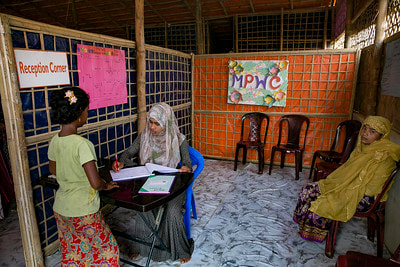March 13th, 2023
After a strong period of Rohingya advocacy, the Canadian government has just pledged $27.5M towards the Multi-Year Resilience Programme (MYRP), a 2018 joint initiative of the UN and Bangladeshi. MYRP focuses on improving education for vulnerable and marginalized Rohingya children and youth.
Supported by Global Affairs Canada, MYRP will provide educational resources to Rohingya children living in Bangladeshi refugee camps after fleeing persecution in Burma (Myanmar). The program aims to improve access to quality education for refugee and host communities, emphasizing Rohingya girls and children with disabilities.
“Aid should not only focus on emergencies but how to prevent them. This is only possible by building the agency of Rohingya Muslims. We must recognize how critical education is to increase resilience and opportunities for refugees.” said Taha Ghayyur, Executive Director of Justice For All Canada.
Rohingya Continue Lacking Full Education
Since 2017, Justice For All Canada has continually called for targeted capacity building of Rohingya communities, particularly education. According to our Burma Task Force, the education needs of Rohingya refugees are extensive and ongoing. Rohingya children have been out of school for years. They lack basic literacy and numeracy skills. They face barriers to education, language issues, discrimination, and a lack of resources and infrastructure in refugee camps.
The Canadian-supported MYRP aims to address some of these barriers to education, including improving education quality, teacher training, and providing learning materials.
According to a 2020 report by the UNHCR, there is still a pressing need for Rohingya education beyond the primary level. Approximately 3% of Rohingya refugees in Bangladesh have access to formal secondary education. Less than 1% have access to tertiary education.
Unfortunately, MYRP has not committed to providing education above a specific grade level (including higher education). Donor institutions such as Global Affairs Canada must include advocacy for higher education in its funding portfolio for Rohingya.
Rohingya Education Under International Law
When it comes to Rohingya refugee children and youth education, the following applicable protections are outlined in the Convention on the Rights of the Child, the 1951 Refugee Convention, the 1967 Protocol relating to the Status of Refugees, and the 2018 Global Compact on Refugees;
After a strong period of Rohingya advocacy, the Canadian government has just pledged $27.5M towards the Multi-Year Resilience Programme (MYRP), a 2018 joint initiative of the UN and Bangladeshi. MYRP focuses on improving education for vulnerable and marginalized Rohingya children and youth.
Supported by Global Affairs Canada, MYRP will provide educational resources to Rohingya children living in Bangladeshi refugee camps after fleeing persecution in Burma (Myanmar). The program aims to improve access to quality education for refugee and host communities, emphasizing Rohingya girls and children with disabilities.
“Aid should not only focus on emergencies but how to prevent them. This is only possible by building the agency of Rohingya Muslims. We must recognize how critical education is to increase resilience and opportunities for refugees.” said Taha Ghayyur, Executive Director of Justice For All Canada.
Rohingya Continue Lacking Full Education
Since 2017, Justice For All Canada has continually called for targeted capacity building of Rohingya communities, particularly education. According to our Burma Task Force, the education needs of Rohingya refugees are extensive and ongoing. Rohingya children have been out of school for years. They lack basic literacy and numeracy skills. They face barriers to education, language issues, discrimination, and a lack of resources and infrastructure in refugee camps.
The Canadian-supported MYRP aims to address some of these barriers to education, including improving education quality, teacher training, and providing learning materials.
- Constructing new classrooms and rehabilitating infrastructure, helping improve education access for Rohingya children.
- Supporting MYRP's education interventions and other activities to improve communities Cox's Bazar, including health, water and sanitation, and livelihood intervention.
According to a 2020 report by the UNHCR, there is still a pressing need for Rohingya education beyond the primary level. Approximately 3% of Rohingya refugees in Bangladesh have access to formal secondary education. Less than 1% have access to tertiary education.
Unfortunately, MYRP has not committed to providing education above a specific grade level (including higher education). Donor institutions such as Global Affairs Canada must include advocacy for higher education in its funding portfolio for Rohingya.
Rohingya Education Under International Law
When it comes to Rohingya refugee children and youth education, the following applicable protections are outlined in the Convention on the Rights of the Child, the 1951 Refugee Convention, the 1967 Protocol relating to the Status of Refugees, and the 2018 Global Compact on Refugees;
- Non-discrimination: Rohingya children should not be discriminated against regarding education access. Measures should be taken to ensure Rohingya children have equal access to education as non-refugee children.
- Inclusion: Rohingya refugee children should be included in Bangladesh’s national education system. They should not be segregated or placed in separate schools or classes.
- Special protections: Rohingya refugee children require additional protections when accessing education, such as language support, psychosocial support, and protection from discrimination or harassment.

